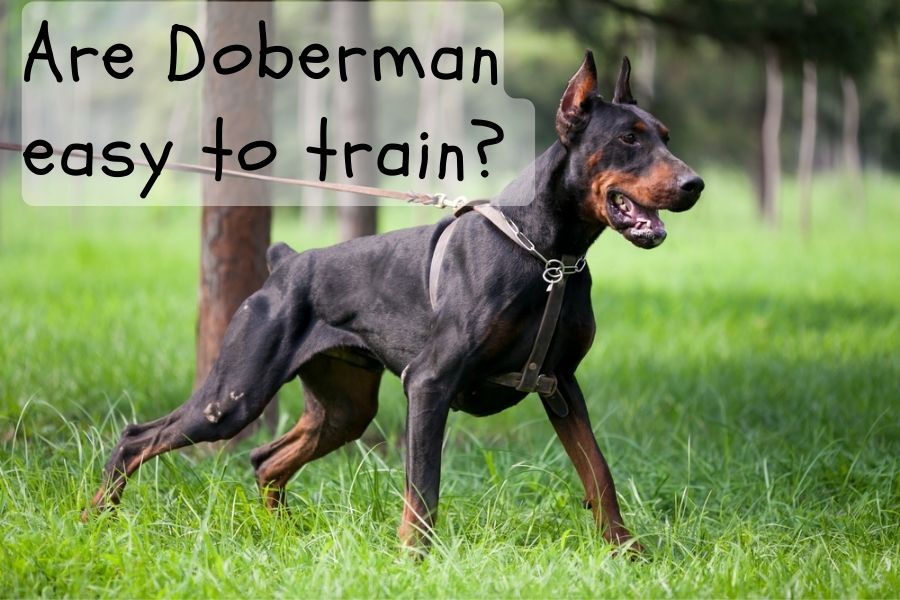Are Dobermans Easy To Train? Tuning into Your Doberman
If you have a Doberman, take into account the breed’s general tendencies as well as the fact that each dog is different.
We’ll talk about what makes Dobermans so interesting to train and give you tips on how to change their behavior so it fits well with your family and lifestyle.
We’ll show you how to train a Doberman, from simple directions to more complicated ones, socialization, and changing the dog’s behavior.
Are Dobermans Easy To Train?
Yes, Dobermans are generally easy to train and do have an easy learning curve. As one of the most intelligent dog breeds, they have been bred for jobs like police and guard duty that call for a high level of training and commitment to sophisticated commands.

Trainability
Dobermans are often eager to please and tend to pick up new commands and tasks quickly. Treats, praise, and play rewards are all efficient forms of positive reinforcement training for them.
Louis Dobermann, a tax collector, created the Doberman Pinscher breed in Germany in the late 19th century. As part of his job, Dobermann often traveled with bags of money, and he wanted a medium-sized protective dog to accompany him.
Originally, Dobermans were bred to be protector dogs and companion dogs. In modern times, their intelligence and trainability have led to widespread use in fields including police work, search and rescue, and therapy.
Modern Dobermans retain the intelligence, loyalty, velocity, and strength that were essential to these dogs success in their initial jobs.
Even though they retain a natural defensive drive, breeders have paid more attention to the Doberman’s temperament over time; thus, modern Dobermans are often friendlier and less aggressive than their ancestors.
However, because of their intelligence and energy, Dobermans require constant, appealing training, including obedience, tracking, and agility. They can become bored with repetition and become distracted or stubborn if they do not find the training exciting. This is why it’s important to regularly introduce new commands or tasks to keep sessions fresh and exciting.

Adaptability
Dobermans are intelligent and trainable, which helps them adapt to a variety of situations. They can live in different types of homes, from apartments to large houses with yards, as long as they get sufficient exercise and mental stimulation. However, they are an active breed and would do best with space to move freely.
In terms of climate, Dobermans have a short, thin coat and don’t handle extremely cold temperatures well. They are more suited to moderate climates but can adapt to warmer ones.
The most common training for Dobermans
Obedience Training: This is typically the first type of training you’ll do with your Doberman. This includes teaching them basic commands like “sit”, “stay”, “down”, “come”, and “heel”. As you continue to teach him basic and new commands, he will come to respect you as his superior, and your connection will grow stronger.
Socialization Training: Socializing your Doberman when they’re young is important. Make sure they’re used to being around diverse people, places, and animals to ensure they do not acquire any behavioral issues.
Agility Training: Dobermans are athletic dogs and excellent candidates for agility training. Navigating through obstacle courses is a type of this training; it can exercise both their bodies and minds.

Clicker Training: A positive reinforcement training where a clicker is used to mark the behavior you want to encourage. When your Doberman performs the desired behavior, you click the clicker and reward them. Your Doberman can easily associate the behavior with the reward.
Crate Training: This helps your Doberman view their crate as a safe space, which can be beneficial for house training, travel, and giving your dog a place to go when they want to relax.
Leash Training: Being on a leash can ensure your Doberman walks nicely without pulling or escaping. Leash training often goes hand in hand with obedience training.
Behavioral Training: This includes things like potty training and discouraging behaviors like chewing, barking, or jumping up on people.
Advanced Training: For Dobermans who excel at basic training, there are more advanced options like search and rescue training, therapy dog training, or even Schutzhund (a rigorous training program developed for German Shepherds that tests various skills including tracking, obedience, and protection).
The Purpose Of Training A Doberman
Because of their natural protective instincts, they need early and consistent training to avoid becoming anxious around strangers or hostile towards other animals.
Promotes Good Behavior
Training gives structure and boundaries, which may help a dog understand their place in the home. A dog can learn appropriate and inappropriate behavior through training. Teaching them basic manners like not jumping on people or chewing on furniture is part of this.

Ensures Safety
A well-trained dog is safer to be around. They are often calm and not easily provoked. A trained dog can also be more in control in potentially dangerous situations. A dog that knows to return when called can be helpful if it wanders too close to a busy street, for instance.
Dobermans are known to be devoted to their families but can be reserved around strangers, thus, socializing is an important part of training.
In general, they get along well with the kids in their own families, especially if they were reared together, but they may be less patient with strangers’ kids. Generally speaking, Dobermans can get along with other dogs and pets if they coexist with them as puppies.
A well-trained Doberman is more enjoyable to have around and can take part in all the fun with the family. Whether it’s a hike, a picnic, or just a casual walk in the park, a trained Doberman will be more relaxed and enjoyable company.
Conclusion
Training a dog is as much a journey for the owner as it is for the pet, and when it comes to Dobermans. It relies on a plethora of factors, including your approach to training, the dog’s individual personality, and even their unique history.









